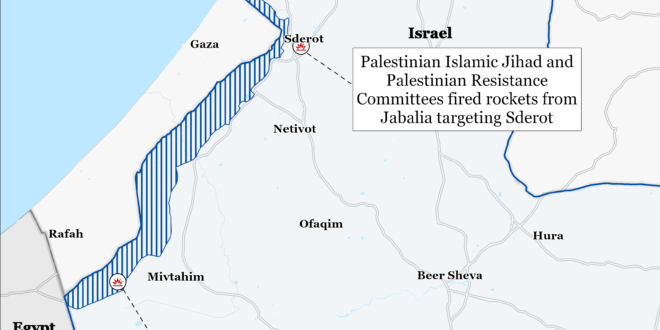Hamas is continuing to discuss its desired political end state in which a Hamas-influenced government governs the West Bank and the Gaza Strip. Hamas Political Bureau Chairman Ismail Haniyeh gave a speech on May 15 that outlined this end state, which will include an “administration” for the post-war Gaza Strip that Hamas will build alongside “all [Palestinian] factions.”[i] Hamas has had a vision for the post-war Gaza Strip since at least late December 2023, when Haniyeh said Hamas was open to a national unity government” including Hamas that would rule both the Gaza Strip and the West Bank.[ii] Both Russia and China have supported this effort since at least February 2024. Russia facilitated Hamas-Fatah talks in February 2024 that sought to achieve “Palestinian unity,” and China hosted senior Hamas and Fatah officials in Beijing on April 26 to “strive for the early realization of Palestinian unity and reunification.”[iii] Fatah is the party that controls the Palestinian Authority and would be the main Hamas governing partner in a unity government.
Hamas probably sees an opportunity to exploit this war and Hamas’ relative popularity in the West Bank to expand its political control in the West Bank and the Gaza Strip. Fatah leader and Palestinian Authority President Mahmoud Abbas is 88 years old and has not identified a successor.[iv] Hamas almost certainly views the lack of a successor and Abbas’ age as a weakness it will be able to exploit once Abbas dies. The war has also increased Hamas’ popularity in the West Bank, according to a Palestinian polling organization. Thirty-five percent of West Bankers support Hamas as of March 2024 compared to 12% of West Bankers in September 2023.[v] Only 12% of West Bankers support Fatah as of March 2024, and 47% of West Bankers support no party.[vi] Hamas likely assesses it can leverage these trends to improve its political position vis-a-vis Fatah and Israel by expanding Hamas’ political control to the West Bank.
Israeli Prime Minister Benjamin Netanyahu suggested that he would be open to a post-war Gazan authority that excludes the Palestinian Authority.[vii] Netanyahu made unspecified comments that suggested his openness to a local authority in the Gaza Strip during a cabinet meeting. This follows criticism from several senior Israeli officials, including the defense minister, who oppose establishing a military government in the Gaza Strip and demand a clear post-war plan.[viii] Netanyahu suggested that a “non-Hamas civilian administration with overall Israeli military responsibility” could govern the Strip during an interview with CNBC in April 2024.[ix] Israel has reportedly engaged with Palestinians unaffiliated with Hamas during the war to discuss governance issues, including managing the Rafah crossing and distributing and securing aid.[x]
Key Takeaways:
- Post-War Governance: Hamas is continuing to discuss its desired political end state in which a Hamas-influenced government governs the West Bank and the Gaza Strip. Netanyahu separately suggested he would be open to a post-war Gaza that excludes the Palestinian Authority. Several senior Israeli officials have recently criticized Netanyahu for his unwillingness to define a post-war plan.
- Northern Gaza Strip: Israeli forces described the fighting in Jabalia as some of the most intense of the war.
- Southern Gaza Strip: Israeli forces continued clearing operations in several areas of eastern Rafah.
- Humanitarian Aid: Aid trucks began transporting supplies from the US-constructed offshore pier into the Gaza Strip.
- West Bank: Israeli forces engaged Palestinian fighters in at least four locations in the West Bank.
- Southern Lebanon and Golan Heights: Lebanese Hezbollah conducted at least 13 attacks into northern Israel.
- Iran: Former Islamic Revolutionary Guard Corps (IRGC) Commander Mohsen Rezaei claimed that Iran launched 162 drones, 30 cruise missiles and 100 ballistic missiles during its April 13 drone and missile attack on Israel.
- Yemen: Houthi Spokesperson Brig. Gen. Yahya Sarea claimed that Houthi air defenses shot down a US MQ-9 Reaper drone over a Houthi-controlled area of Ma’rib Governorate, Yemen.
- Iraq: The Islamic Resistance in Iraq—a coalition of Iranian-backed Iraqi militias—claimed one drone attack targeting Israel.
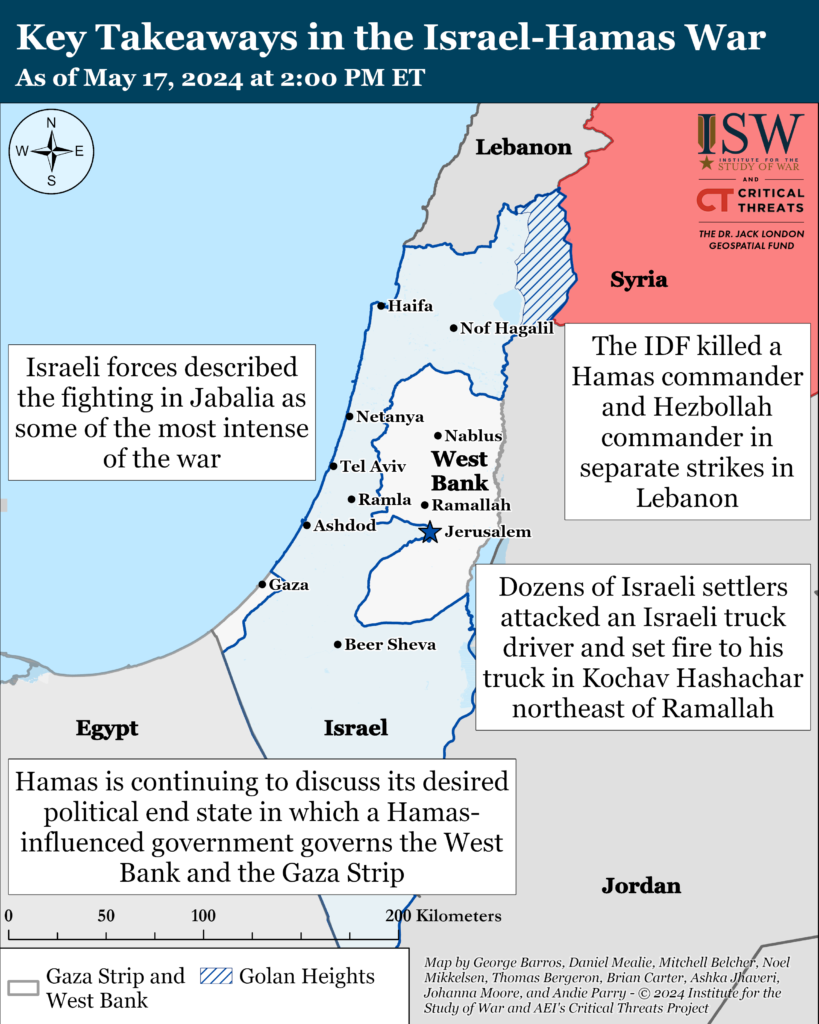
Gaza Strip
Axis of Resistance objectives:
Erode the will of the Israeli political establishment and public to sustain clearing operations in the Gaza Strip
Reestablish Hamas as the governing authority in the Gaza Strip
Israeli forces described the fighting in Jabalia as some of the most intense of the war. The IDF began clearing operations in Jabalia on May 11 and reached the city center by May 17.[xi] Palestinian militias have maintained the highest daily attack rate of the war in Jabalia. Israeli officers told Israeli media that the engagements with Palestinian fighters, both above and below ground, have been the “most violent” of the war, highlighting the challenges of maneuvering through the narrow alleys of Jabalia refugee camp.[xii] Palestinian militias have been using explosive devices and firing rocket-propelled grenades.[xiii] Israeli forces have killed about 200 Palestinian fighters and detained 40 for questioning during the operation so far.[xiv]
Palestinian militias sustained a high rate of attacks in Jabalia on May 17. The militias claimed 22 attacks.[xv] Hamas claimed that it disrupted Israeli ground lines of communication east of Jabalia refugee camp by attacking Israeli armored personnel carriers and infantry.[xvi] Hamas said that these attacks forced the IDF to change its supply lines multiple times.[xvii] The IDF has not commented on the Hamas attacks. Commercially available satellite imagery captured in May 2024 shows a newly cleared track along the Shaashaa Road east of Jabalia, indicating Israeli efforts to build and protect a road to support operations in Jabalia. Israeli forces originally cleared terrain along the Shaashaa Road in late 2023, according to commercially available satellite imagery.
The IDF published a summary of its activity in Zaytoun neighborhood, southern Gaza City, after completing a re-clearing operation there on May 16.[xviii] Israeli forces initially launched the operation in Zaytoun on May 8, marking the third time that the IDF has conducted a clearing operation there.[xix] The IDF reported that its forces destroyed rocket launchers, a Hamas headquarters, tunnels, and a lathe for producing weapons.[xx] The IDF Air Force struck more than 100 targets in the area. Israeli forces also engaged Palestinian fighters and destroyed infrastructure along the Netzarim corridor south of Gaza City. The IDF has not confirmed whether Israeli forces have withdrawn from Zaytoun following the operation.
Israeli forces continued clearing operations in several areas of eastern Rafah on May 17. The IDF 401st Brigade destroyed rocket launch sites east of Rafah and found launchers for long-range rockets.[xxi] Israeli forces have located and destroyed several tunnel shafts in the area but have not confirmed whether these tunnels cross into Egypt.[xxii] The Israeli representative to the Hague said on May 17 that Israel has identified nearly 700 tunnel shafts in Rafah and approximately 50 of the 700 tunnels cross into Egyptian territory.[xxiii] The Israeli representative said that Hamas uses the tunnels to smuggle itself weapons and that Hamas could be using the tunnels to smuggle hostages or Hamas senior operatives out of the Gaza Strip.[xxiv] Palestinians developed tunnels between the Gaza Strip and Egypt to smuggle goods under the border several decades ago.[xxv] Several Palestinian militias targeted Israeli command positions and forces in eastern Rafah—including at the Rafah crossing—with rocket and mortar fire.[xxvi]
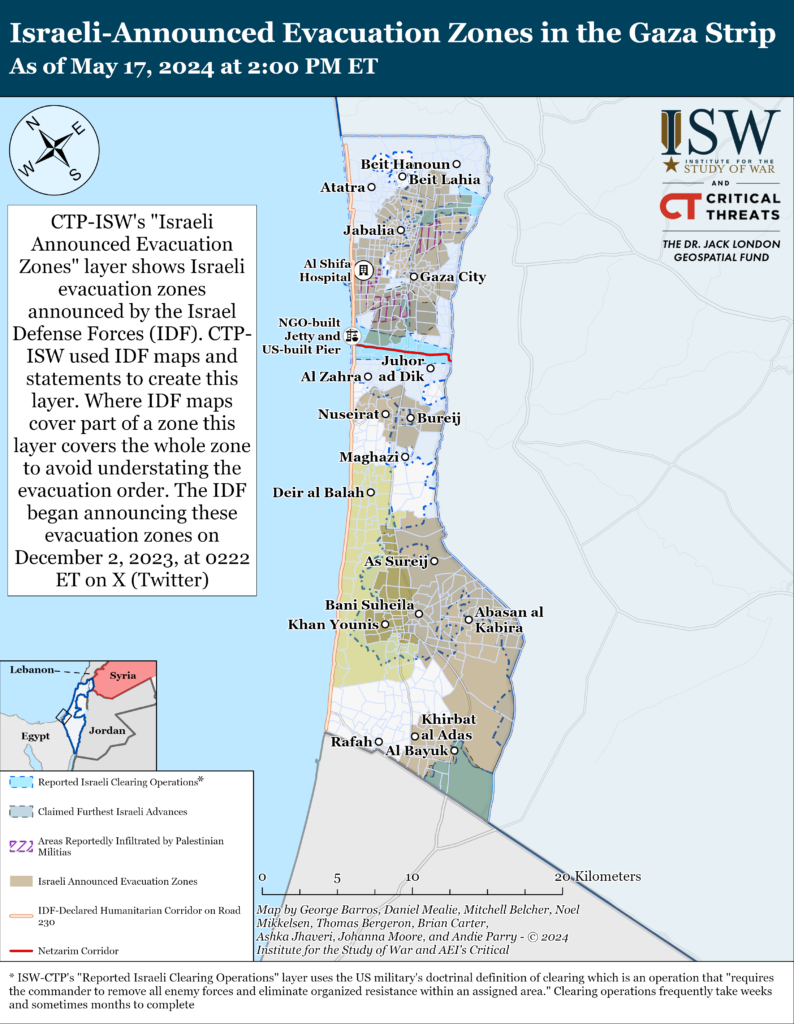
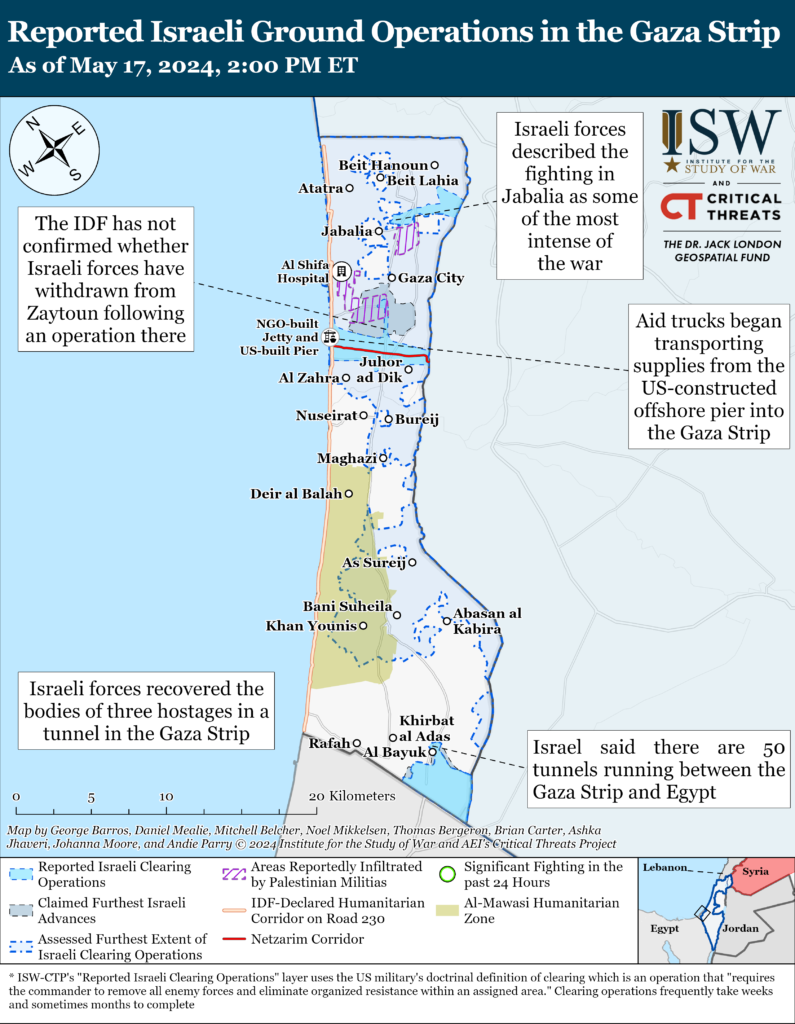
Israeli forces recovered the bodies of three hostages in a tunnel in the Gaza Strip.[xxvii] The IDF spokesperson made the announcement on May 17.[xxviii] Palestinian fighters killed the three hostages during Hamas’ October 7 attack at the Nova music festival and took the bodies into the Gaza Strip.[xxix] Israeli forces located the bodies using information from detained Palestinian fighters.[xxx]
Aid trucks began transporting supplies from the US-constructed offshore pier into the Gaza Strip on May 17.[xxxi] The United Kingdom supplied the aid and has been coordinating logistics in Cyprus, where the aid is inspected.[xxxii] The World Food Programme will deliver the aid to other agencies or distribute it directly.[xxxiii] The aid is destined for both the northern and southern Gaza Strip. The UN anticipates minimal delays at Israeli checkpoints because the aid has been pre-inspected in Cyprus.[xxxiv]
The Washington Post published several satellite images on May 17 that show the development and size of Israeli forward operating bases along the Netzarim Corridor south of Gaza City[xxxv] Israeli forces have established forward operating bases along the corridor, which runs east-west across the Gaza Strip, to facilitate future raids into the northern Gaza Strip.[xxxvi] The corridor meets with the US-constructed offshore pier to facilitate humanitarian aid shipments. An Israeli Army Radio correspondent noted that the IDF has enhanced radar and observation capabilities at some military positions.
Israeli media obtained an Israeli government document that describes the cost of an Israeli military occupation of the Gaza Strip.[xxxvii] The document claimed that occupation would cost 20 billion NIS (roughly 5 billion USD) per year and require five permanent IDF divisions in the Strip. The IDF would be required to dramatically increase the number of reserve soldiers and reduce its forces in IDF Northern and Central Command.
The Arab League called on May 16 for a United Nations peacekeeping force to deploy into the Gaza Strip and the West Bank until a two-state solution can be negotiated.[xxxviii] UN spokesperson Farhan Haq said this is the first time that the Arab League has made the request in a written document. US State Department spokesperson Vedant Patel said that bringing in “additional security forces” could potentially compromise Israel’s campaign to dismantle Hamas when asked about whether the United States would support deploying peacekeepers,.[xxxix]
Palestinian militias conducted at least two indirect fire attacks from the Gaza Strip into Israel on May 17.[xl] The Palestinian Islamic Jihad (PIJ) and the Popular Resistance Committees fired rockets from Jabalia refugee camp in a combined attack targeting Sderot.[xli] An Israeli war correspondent noted that Palestinian militias have been increasingly firing rockets at Sderot as Israeli forces advance in Jabalia.[xlii] Palestinian militias have repeatedly fired rockets into Israel as Israeli ground forces approached launch sites during the war.[xliii]
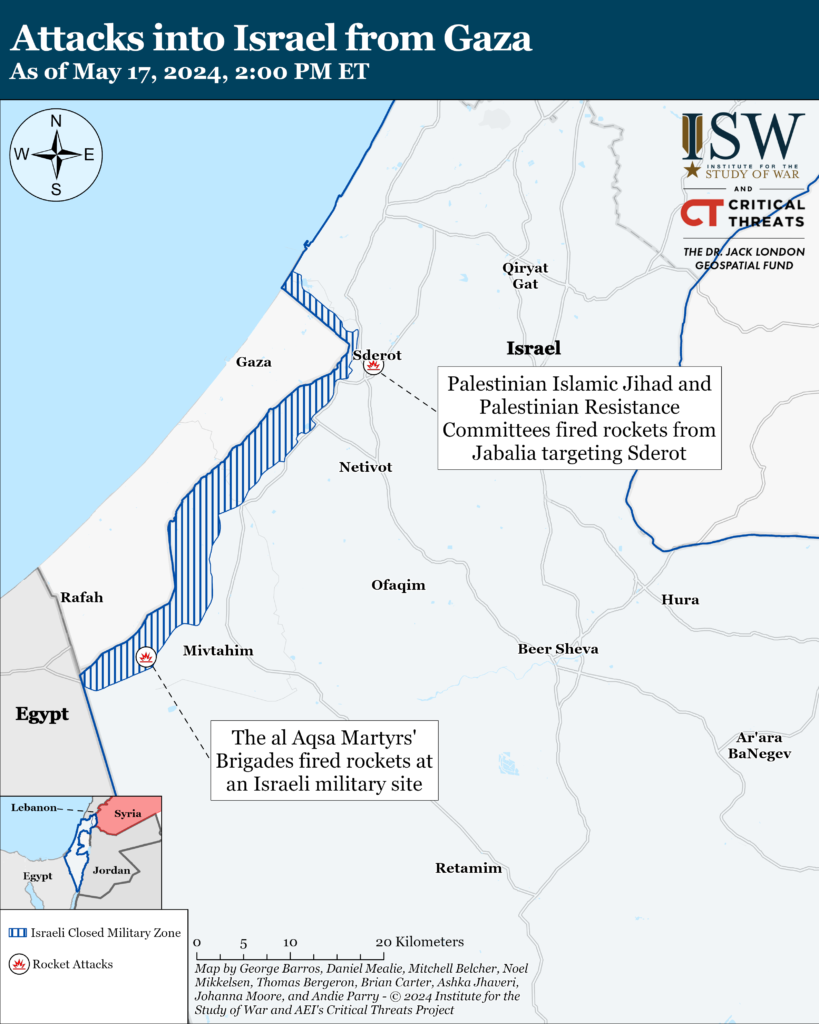
Recorded reports of attacks; CTP-ISW cannot independently verify impact.
West Bank
Axis of Resista
ADD NOTE
TWEET
nce objectives:
Establish the West Bank as a viable front against Israel
Israeli forces have engaged Palestinian fighters in at least four locations in the West Bank since CTP-ISW’s data cut off on May 16.[xliv] Palestinian Islamic Jihad fired small arms and detonated IEDs targeting Israeli forces during operations in Tubas.[xlv]
Dozens of Israeli settlers attacked an Israeli truck driver and set fire to his truck in Kochav Hashachar, northeast of Ramallah, on May 16.[xlvi] Israeli media reported that the settlers believed the truck was transporting humanitarian aid to the Gaza Strip.[xlvii] The IDF said that two officers and one soldier were injured as the IDF intervened.[xlviii] The IDF added that it would act ”to the fullest extent of the law” against anyone who attacks IDF soldiers or Israeli security forces.
Israeli settlers and organizations have repeatedly disrupted the delivery of aid to the Gaza Strip from the West Bank since the Israel-Hamas War began.[xlix] The Times of Israel reported that two unspecified US officials said on May 16 that the Biden administration was looking into sanctioning Israeli settlers involved in the attacks against aid convoys.[l] White House National Security Adviser Jake Sullivan on May 13 called the recent attacks a “total outrage“ and said that the United States is looking into tools it could use to respond.[li]
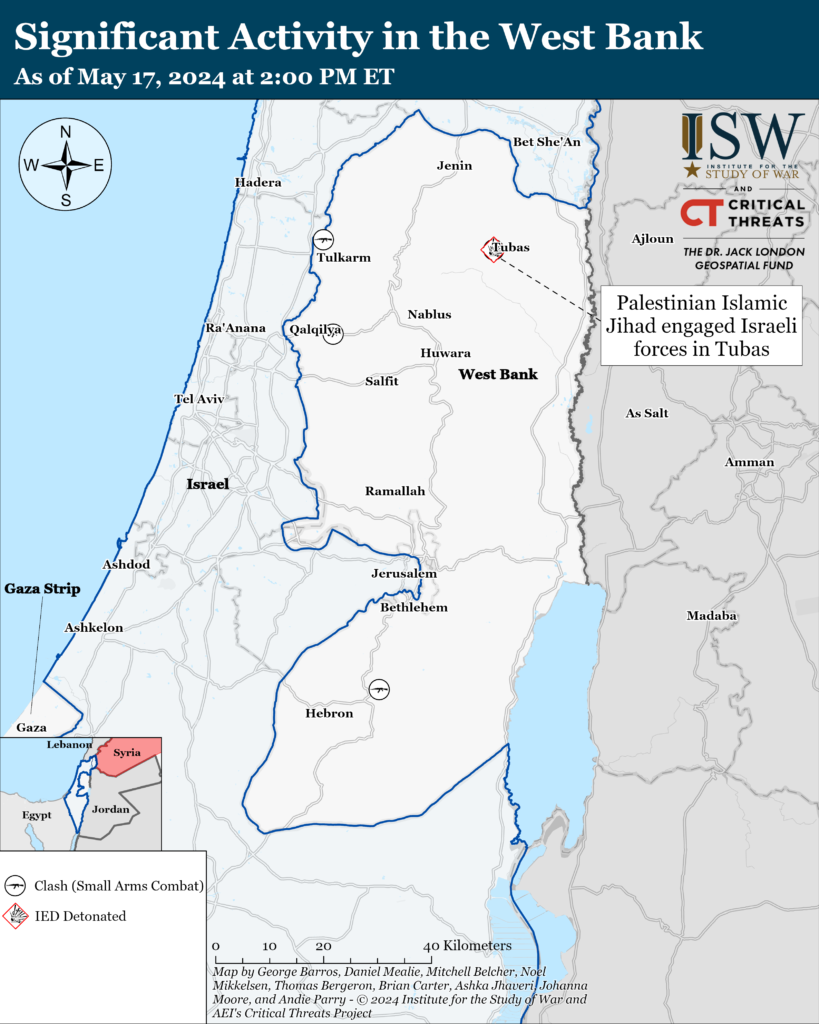
This map is not an exhaustive depiction of clashes and demonstrations in the West Bank.
Southern Lebanon and Golan Heights
Axis of Resistance
ADD NOTE
TWEET
objectives:
Deter Israel from conducting a ground operation into Lebanon
Prepare for an expanded and protracted conflict with Israel in the near term
Expel the United States from Syria
Lebanese Hezbollah has conducted at least 13 attacks into northern Israel since CTP-ISW’s last data cutoff on May 16.[lii] The IDF said that unspecified fighters fired 75 “munitions” from Lebanon targeting Israeli territory.[liii] The IDF added that that it intercepted dozens of these munitions. Hezbollah said that it fired 50 rockets targeting an Israeli logistics base in the Golan Heights and that it fired another rocket salvo targeting Israeli forces in al Zaoura in northern Israel shortly after.[liv] An Israeli Army Radio correspondent said that the attacks injured two Israeli civilians.[lv]
Hezbollah has claimed firing salvos with dozens of rockets into Israel several times per month since February 2023.[lvi] Hezbollah said it fired more than 100 rockets targeting Israeli forces in northern Israel on March 12, marking one of its largest attacks since the Israel-Hamas War began.[lvii]
The IDF killed a Hamas commander in a strike in Lebanon on May 17. An IDF drone strike killed a Hamas commander in Majdal Anjar in the Bekaa Governorate in Lebanon on May 17.[lviii] An unspecified source close to Hamas told Agence France-Presse that the commander was responsible for Hamas activity in the Bekaa region.[lix] Hamas mourned the death of the commander on May 17.[lx]
The IDF also killed a Hezbollah commander in a second strike on May 17. An IDF airstrike killed a senior Hezbollah air force commander in Najariyah, southern Lebanon, according to Israeli sources.[lxi] The IDF confirmed that it conducted strikes targeting Hezbollah compounds in the same area on May 17.[lxii] Israeli sources reported that the commander was responsible for firing one-way attack drones at Israel.[lxiii] Hezbollah mourned the death of the commander on May 17.[lxiv]
IDF Northern Command Maj. Gen. Uri Gordin and Home Front Command Maj. Gen. Rafi Milo met at Northern Command headquarters on May 16.[lxv] Gordin and Milo discussed the continued defense of northern Israel in various conflict scenarios and creating conditions for displaced civilians to return to northern Israel.
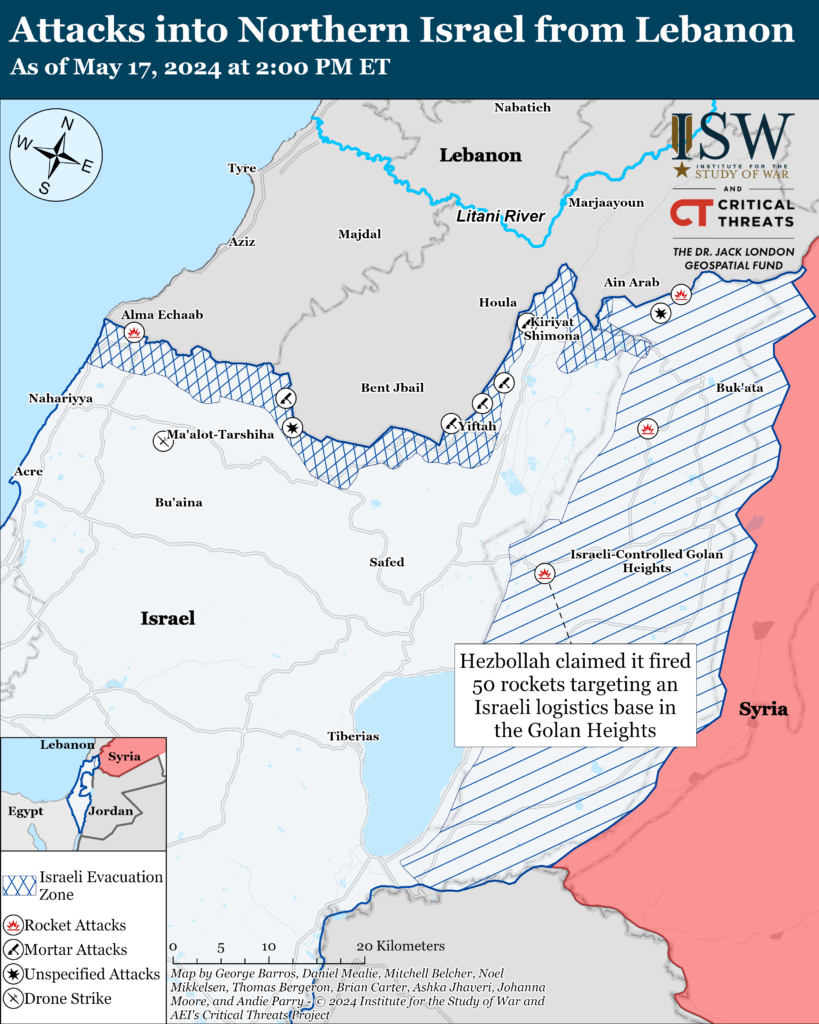
Recorded reports of attacks; CTP-ISW cannot independently verify impact.
Iran and Axis of Resistance
Former Islamic Revolutionary Guard Corps (IRGC) Commander Mohsen Rezaei claimed on May 16 that Iran launched 162 drones, 30 cruise missiles and 100 ballistic missiles during its April 13 drone and missile attack on Israel.[lxvi] The IDF previously stated on April 14 that Iran launched approximately 170 drones, 30 cruise missiles and 120 ballistic missiles.[lxvii] Senior Iranian leaders have previously claimed that Iran’s April 13 attack was a ”success.”[lxviii] Iranian officials have separately stated that Iran has adopted a new “equation” for confronting Israel under which Iran will retaliate by launching attacks targeting Israel directly from Iranian territory should Israel attack Iran or Iranian targets abroad.[lxix]
The Iranian Law Enforcement Command (LEC) arrested over 230 individuals on charges of with performing “acts of satanism” in Shahriar city, 30 km west of Tehran, on May 16.[lxx] The arrest included three European citizens.[lxxi] The arrested individuals were accused of wearing satanic symbols on their clothes and bodies, drinking alcohol, and consuming psychedelic substances.
Houthi Spokesperson Brig. Gen. Yahya Sarea claimed that Houthi air defenses shot down a US MQ-9 Reaper drone over a Houthi-controlled area of Ma’rib Governorate, Yemen, on May 16.[lxxii] Sarea claimed the Houthis used a surface-to-air missile to shoot down the drone.[lxxiii] CENTCOM has not acknowledged the incident. CTP-ISW cannot verify that the Houthis shot down an MQ-9.
The Islamic Resistance in Iraq—a coalition of Iranian-backed Iraqi militias—has claimed one drone attack targeting Israel since CTP-ISW’s last data cut-off on May 16.[lxxiv] The Islamic Resistance in Iraq claimed to strike an unspecified ”vital” target in Eilat, southern Israel.[lxxv] CTP-ISW cannot verify that the claimed attack occurred.
The Shia Coordination Framework—a loose coalition of Iranian-aligned Shia political parties—held an “emergency meeting” on May 16 to discuss the selection of the next speaker of the Council of Representatives.[lxxvi] The Shia Coordination Framework called for all members of parliament to attend the May 18 election of a new parliament speaker. Iraqi parliament must reach a two-thirds quorum on May 18 to hold the vote.[lxxvii]
 Eurasia Press & News
Eurasia Press & News
